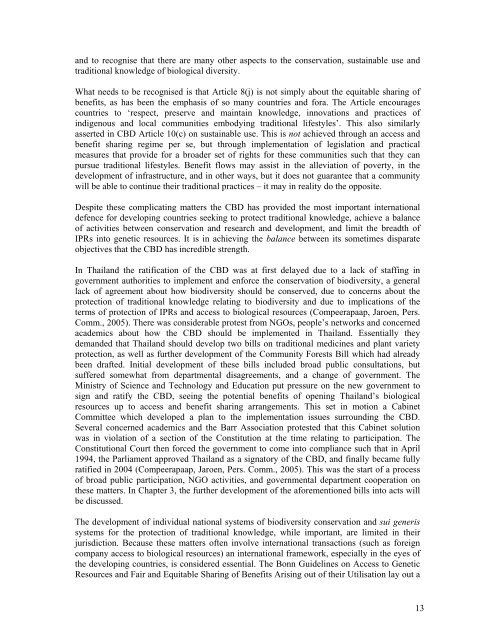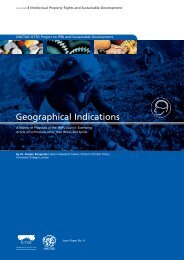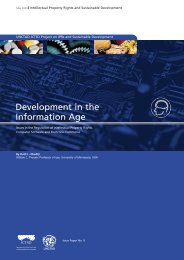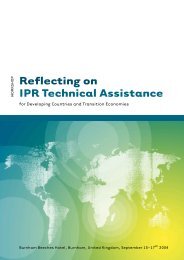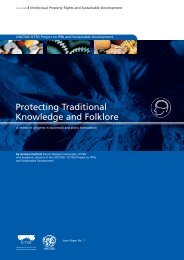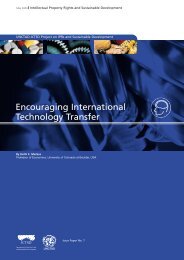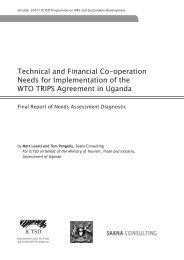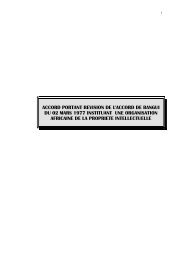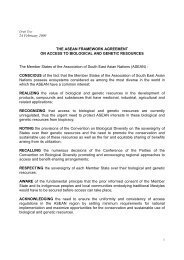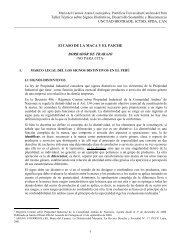Governance and Micropolitics of Traditional ... - IPRsonline.org
Governance and Micropolitics of Traditional ... - IPRsonline.org
Governance and Micropolitics of Traditional ... - IPRsonline.org
You also want an ePaper? Increase the reach of your titles
YUMPU automatically turns print PDFs into web optimized ePapers that Google loves.
<strong>and</strong> to recognise that there are many other aspects to the conservation, sustainable use <strong>and</strong><br />
traditional knowledge <strong>of</strong> biological diversity.<br />
What needs to be recognised is that Article 8(j) is not simply about the equitable sharing <strong>of</strong><br />
benefits, as has been the emphasis <strong>of</strong> so many countries <strong>and</strong> fora. The Article encourages<br />
countries to ‘respect, preserve <strong>and</strong> maintain knowledge, innovations <strong>and</strong> practices <strong>of</strong><br />
indigenous <strong>and</strong> local communities embodying traditional lifestyles’. This also similarly<br />
asserted in CBD Article 10(c) on sustainable use. This is not achieved through an access <strong>and</strong><br />
benefit sharing regime per se, but through implementation <strong>of</strong> legislation <strong>and</strong> practical<br />
measures that provide for a broader set <strong>of</strong> rights for these communities such that they can<br />
pursue traditional lifestyles. Benefit flows may assist in the alleviation <strong>of</strong> poverty, in the<br />
development <strong>of</strong> infrastructure, <strong>and</strong> in other ways, but it does not guarantee that a community<br />
will be able to continue their traditional practices – it may in reality do the opposite.<br />
Despite these complicating matters the CBD has provided the most important international<br />
defence for developing countries seeking to protect traditional knowledge, achieve a balance<br />
<strong>of</strong> activities between conservation <strong>and</strong> research <strong>and</strong> development, <strong>and</strong> limit the breadth <strong>of</strong><br />
IPRs into genetic resources. It is in achieving the balance between its sometimes disparate<br />
objectives that the CBD has incredible strength.<br />
In Thail<strong>and</strong> the ratification <strong>of</strong> the CBD was at first delayed due to a lack <strong>of</strong> staffing in<br />
government authorities to implement <strong>and</strong> enforce the conservation <strong>of</strong> biodiversity, a general<br />
lack <strong>of</strong> agreement about how biodiversity should be conserved, due to concerns about the<br />
protection <strong>of</strong> traditional knowledge relating to biodiversity <strong>and</strong> due to implications <strong>of</strong> the<br />
terms <strong>of</strong> protection <strong>of</strong> IPRs <strong>and</strong> access to biological resources (Compeerapaap, Jaroen, Pers.<br />
Comm., 2005). There was considerable protest from NGOs, people’s networks <strong>and</strong> concerned<br />
academics about how the CBD should be implemented in Thail<strong>and</strong>. Essentially they<br />
dem<strong>and</strong>ed that Thail<strong>and</strong> should develop two bills on traditional medicines <strong>and</strong> plant variety<br />
protection, as well as further development <strong>of</strong> the Community Forests Bill which had already<br />
been drafted. Initial development <strong>of</strong> these bills included broad public consultations, but<br />
suffered somewhat from departmental disagreements, <strong>and</strong> a change <strong>of</strong> government. The<br />
Ministry <strong>of</strong> Science <strong>and</strong> Technology <strong>and</strong> Education put pressure on the new government to<br />
sign <strong>and</strong> ratify the CBD, seeing the potential benefits <strong>of</strong> opening Thail<strong>and</strong>’s biological<br />
resources up to access <strong>and</strong> benefit sharing arrangements. This set in motion a Cabinet<br />
Committee which developed a plan to the implementation issues surrounding the CBD.<br />
Several concerned academics <strong>and</strong> the Barr Association protested that this Cabinet solution<br />
was in violation <strong>of</strong> a section <strong>of</strong> the Constitution at the time relating to participation. The<br />
Constitutional Court then forced the government to come into compliance such that in April<br />
1994, the Parliament approved Thail<strong>and</strong> as a signatory <strong>of</strong> the CBD, <strong>and</strong> finally became fully<br />
ratified in 2004 (Compeerapaap, Jaroen, Pers. Comm., 2005). This was the start <strong>of</strong> a process<br />
<strong>of</strong> broad public participation, NGO activities, <strong>and</strong> governmental department cooperation on<br />
these matters. In Chapter 3, the further development <strong>of</strong> the aforementioned bills into acts will<br />
be discussed.<br />
The development <strong>of</strong> individual national systems <strong>of</strong> biodiversity conservation <strong>and</strong> sui generis<br />
systems for the protection <strong>of</strong> traditional knowledge, while important, are limited in their<br />
jurisdiction. Because these matters <strong>of</strong>ten involve international transactions (such as foreign<br />
company access to biological resources) an international framework, especially in the eyes <strong>of</strong><br />
the developing countries, is considered essential. The Bonn Guidelines on Access to Genetic<br />
Resources <strong>and</strong> Fair <strong>and</strong> Equitable Sharing <strong>of</strong> Benefits Arising out <strong>of</strong> their Utilisation lay out a<br />
13


